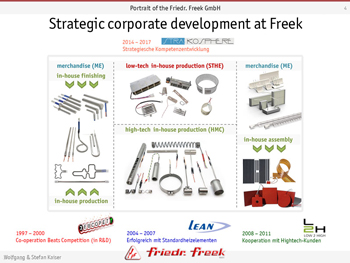In a turbulent environment dominated by global networks, cross-market integration, product individualisation and high innovation dynamics, a family enterprise from Menden in Germany's Sauerland region has shown impressively just how important strategic corporate development and a high level of adaptability are for sustained corporate success.
The ground-breaking step in development was taken in the mid 1990s with the foundation of the innovation network Eucopet1 In the course of initiating and organising collaboration between like-minded competitors from across Germany and Europe, the brothers Wolfgang and Stefan Kaiser transformed the corporate organisation into a cooperation organisation, making a top team out of their workforce in the process [10]. The result has been the creation of a new generation of internally produced nozzle heaters (HotMicroCoils), the opening of new markets in the plastics industry and access to new global markets through the cooperation partners [11].
At the beginning of the millennium, in the wake of Eucopet, the simple standard heating element then experienced a renaissance, and the research project Lean2 – a business model in which market-oriented flexibility and cost-minimising standardisation do not contradict one another – was introduced into the traditional low-tech segment of the company. The success of the simple standard heating element that ensued, provided the company with its second, long-lasting growth cycle after Eucopet [9].
The company managed to survive the crisis-year 2009 with a respectable result, using the time to focus on project work. Some promising project developments were brought forward and the Lean-business model in the new research project Low2High3, in particular, underwent further strategic development. The aim was to better meet the demands of the steadily growing clientele of demanding high-tech customers and to serve them more professionally. Through the effective design and consistent alignment of internal processes towards the customer, a higher level of quality, a higher standard of service and more flexible processes can today be guaranteed for high-tech partners. Thanks to Low2High, Freek has succeeded in continuing to produce simple heating elements on an internationally competitive basis within high-wage Germany and thereby to offer an adequate employment to employees with low qualifications.
It was again primarily workers with low or unsuitable qualifications that formed the focus of the research in the most recent collaborative project, StraKosphere4. After all, these are the people who face the biggest challenge in getting to grips with more complex production systems, short production cycles, accelerated technological change and new forms of company organisation and business models, products and services. Competent employees at all levels of qualification are and remain the necessary foundation to enable innovation and competitiveness in these processes, and not only for Freek. Taking into account the demographic structure, through its involvement in StraKosphere Freek has therefore made alterations to its labour organisation, created positions that encourage learning and promote health and strengthened the culture of innovation and cooperation within the company on a lasting basis.
- 1
- The EUREKA cooperation project European R&D co-operation among small and medium sized competitors (Eucopet) was subsidised by the Federal Ministry of Education and Research (BMBF) framework concept Production 2000 and supervised by the Project Management Agency Karlsruhe (PTKA) (eucopet-heaters.freek.de).
- 2
- The cooperation project Lean Implementation - pragmatic implementation of integrated business models in companies with standard manufacturing (Lean) was supported by the Federal Ministry of Education and Research (BMBF) framework concept Research for tomorrow's production methods and was supervised by the Project Management Agency Karlsruhe (PTKA) . Lean-Projektflyer
- 3
- The cooperation project Innovation management for lowtech-hightech cooperation (Low2High) is jointly funded by the Federal Ministry of Education and Research (BMBF) and the European Social Fund (ESF) of the European Union in the BMBF research and development programme Working – Learning – Competence Development – Innovation ability in a modern working environment, and is supervised by the project management section of the German Aerospace Center (PT-DLR) . Low2High-Projektflyer
- 4
- The cooperation project StraKosphere - strategic competence management in non-research-intensive SMEs in the manufacturing industry was supported by the Federal Ministry of Education and Research (BMBF) framework concept "Arbeiten – Lernen – Kompetenzen entwickeln. Innovationsfähigkeit in einer modernen Arbeitswelt" and was supervised by the Project Management Agency Karlsruhe (PTKA) (www.strakosphere.de).
back to "Motivation" forward to "Research Project Eucopet"

